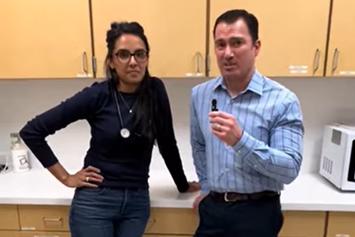
Food Allergy vs. Intolerance: Knowing the Difference
A food allergy diagnosis can dramatically alter one’s life. While many people experience various symptoms after eating certain foods, it is important to understand the differences between food allergy and intolerance.
Videos

Common Food Allergy Questions, Answered
Dr. Dave Stukus and Dr. Farah Khan share answers to the most common food allergy questions asked by parents!

Food Allergy vs. Food Intolerance: Know the Difference
While both food intolerances and food allergies cause symptoms, it is important to recognize their differences! Using the proper definition of food intolerance and food allergy (anaphylaxis) will help keep your child and other children safe.

Oral Food Challenges for Kids
Oral food challenges are one of the most important things done at Nationwide Children’s Food Allergy Treatment Center. Find out what they are for and how they make a difference in children’s lives.

Oral Immunotherapy
Oral immunotherapy, or OIT, is a daily treatment where children are given very small amounts of an allergen in a controlled setting. Learn how the experts at Nationwide Children's use OIT to help kids manage their allergies.

Allergy Appointments Made Easy | What You Need to Know
Preparing for an allergy appointment can feel overwhelming, but it doesn’t have to be. In this video, we provide you with essential tips and tricks to make your next visit to the allergist smooth and stress-free.
Blog Posts

FDA’s Red Dye No. 3 Ban: What It Means for Your Family’s Health
In January 2025, the FDA banned red dye No. 3 due to potential health risks. Found in candies, drinks, and even some medications, this synthetic coloring has raised concerns over its safety. Discover what this ban means for your family, which foods to watch out for, and how it could help you make healthier choices.

Needle-Free Epinephrine: What Parents Need to Know
Epinephrine is the only treatment for anaphylaxis, a potentially severe life-threatening allergic reaction. A pharmaceutical company has been working on a device to deliver the medication through a nasal spray.

6 Tips for Trick-or-Treating with Food Allergies
Any food centered event can introduce challenges for families and children with food allergies. Trick or treating and Halloween celebrations, in particular, present opportunities for increased exposure to food allergens, which can be present in candy and other treats.

EpiPens: What Parents and Caregivers Need to Know
Emergency epinephrine is THE treatment you need for anaphylaxis. Anaphylaxis is a potentially severe life-threatening allergic reaction. Epinephrine reverses the reaction and can save a life.

Honey and Allergies: Don’t Fall for the Marketing!
Honey is often touted as a treatment for seasonal allergies (especially if it’s local or organic). While honey does taste delicious, unfortunately it is not a proven treatment for allergies.

Food Allergies and Anxiety
Families with food allergies often must consider safety, since food is such a big part of our society. Because of this, children and their parents might experience anxiety, especially in places such as school, birthday parties, restaurants, sleepovers, and when traveling.

Food Sensitivity Tests: The Pitfalls of Home Testing Kits
At-home tests are being marketed as a convenient way to determine food sensitivity. Read what our allergy expert has to say about what these tests can and can't do.

The Importance of Reading Labels for Food Allergen Avoidance
Reading labels can be tricky and ingredient lists can change suddenly without warning. It is recommended that people with food allergies read all labels prior to eating products, including those they have safely eaten before.

Are Allergies Caused by C-Sections?
As rates of food allergies and other allergic conditions continue to increase among children, the search for prevention strategies has taken center stage among researchers.
